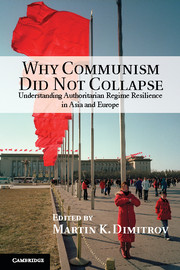Book contents
- Frontmatter
- Contents
- Tables and Figures
- List of Contributors
- Acknowledgments
- Abbreviations
- Part I Reform and Resilience
- Part II Ideology and Resilience
- Part III Contagion and Resilience
- Part IV Inclusion and Resilience
- 7 Authoritarian Survival, Resilience, and the Selectorate Theory
- 8 Cause or Consequence?
- Part V Accountability and Resilience
- Miscellaneous Bibliography
- General Bibliography
- Index
- References
8 - Cause or Consequence?
Private-Sector Development and Communist Resilience in China
Published online by Cambridge University Press: 05 August 2013
- Frontmatter
- Contents
- Tables and Figures
- List of Contributors
- Acknowledgments
- Abbreviations
- Part I Reform and Resilience
- Part II Ideology and Resilience
- Part III Contagion and Resilience
- Part IV Inclusion and Resilience
- 7 Authoritarian Survival, Resilience, and the Selectorate Theory
- 8 Cause or Consequence?
- Part V Accountability and Resilience
- Miscellaneous Bibliography
- General Bibliography
- Index
- References
Summary
Taking a page from students of Latin America and Eastern Europe, China specialists routinely invoke the concept of “regime transition,” despite the fact that the post-Mao period of PRC history has already lasted longer than the Maoist era that preceded it.
Elizabeth J. Perry (2007)Students of modernization theory and political development have been anticipating regime change in China for quite some time. In a straight application of modernization theory, for example, in 1996 the Stanford economist Henry Rowen predicted that if China maintained a 5 percent per capita growth in GDP, then by 2015 it would reach a critical level of $7,000–8,000 per capita GDP and become democratic. In 1998 Arthur Waldron predicted impending communist collapse: “Will there still be a People’s Republic of China governed by the Chinese Communist Party in ten years? My bet is ‘no.’” Bruce Gilley contends with equal confidence in China’s Democratic Future, “The laws of social science grind away in China as elsewhere, whether we like it or not.” Following years of double-digit growth, the private sector now accounts for two-thirds of China’s industrial output, a level comparable to that of the United Kingdom on the eve of Margaret Thatcher’s reforms in the 1980s. The accompanying growth in the ranks of Chinese capitalists has fueled popular expectations that they will rise as a class to overthrow the communist regime and demand democracy in the spirit of “no taxation without representation.” Yet the Chinese Communist Party (CCP) continues to monopolize political power, as it has since 1949. Neither communist demise nor democratic transition appears imminent. Meanwhile, major changes have occurred in China’s formal institutions. How can this be explained?
- Type
- Chapter
- Information
- Why Communism Did Not CollapseUnderstanding Authoritarian Regime Resilience in Asia and Europe, pp. 205 - 234Publisher: Cambridge University PressPrint publication year: 2013
References
- 4
- Cited by



